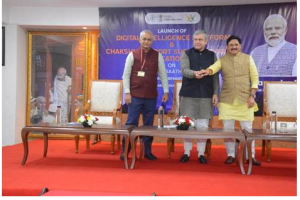ForumIAS announcing GS Foundation Program for UPSC CSE 2025-26 from 19 April. Click Here for more information.
ForumIAS Answer Writing Focus Group (AWFG) for Mains 2024 commencing from 24th June 2024. The Entrance Test for the program will be held on 28th April 2024 at 9 AM. To know more about the program visit: https://forumias.com/blog/awfg2024
Source-This post on Digital Intelligence Platform (DIP) & Chakshu facility is based on the article “MoC Ashwini Vaishnaw launches DoT’s Digital Intelligence Platform (DIP)” published in “PIB” on 4th March 2024.
Why in the News?

Recently, the Minister of Communications, Mr. Ashwini Vaishnaw, launched the Department of Telecommunications (DoT)’s ‘Digital Intelligence Platform (DIP)‘ and the ‘Chakshu facility‘ on the Sanchar Saathi portal.
About Digital Intelligence Platform (DIP)
1. About– It serves as a secure and unified platform for real-time intelligence sharing, information exchange, and coordination among various stakeholders. Stakeholders includes Telecom Service Providers (TSPs), law enforcement agencies (LEAs), banks and financial institutions (FIs), social media platforms, and identity document issuing authorities.
2. Developed by– Department of Telecommunications
3. Features:
a. The portal also includes details of cases identified as misuse of telecom resources. The shared information may benefit stakeholders in their respective fields.
b. It also functions as a backend storage system for requests initiated by citizens on the Sanchar Saathi portal, which stakeholders can act upon.
c. The DIP is available to stakeholders through secure connections, and they receive relevant information based on their roles.
Note- Citizens do not have access to this platform.
What is Chakshu facility?
1. About– It is the latest feature added to the citizen-centric services already available on the Department of Telecommunications’ Sanchar Saathi portal.
2. Features:
a. It allows citizens to report suspected fraudulent communications received through calls, SMS, or WhatsApp.
b. Fraudulent messages which are included – Messages related to KYC updates, changes to bank accounts, payment wallets, SIM cards, gas connections, or electricity connections, as well as instances of sextortion or impersonation as a government official or relative requesting money, and disconnection of all mobile numbers by the Department of Telecommunications.
UPSC Syllabus- Schemes & Programmes




